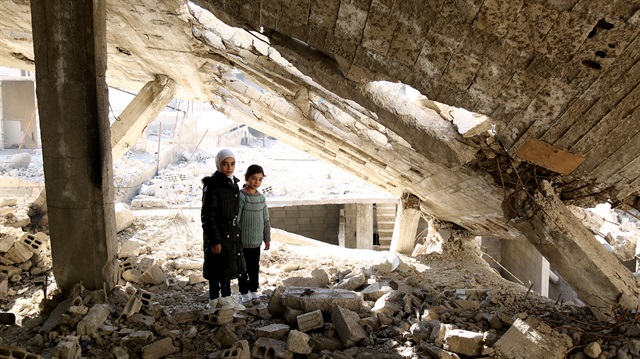
Recent differences in British and American goals in Middle East result in divergent policies
Washington wants Hezbollah out of Syria. London wants British fighters with Daesh eliminated before they return home. The difference in American and British goals have resulted in diverging policies.
America thinks a Russia-sponsored [Bashar al-]Assad might help eradicate Iranian influence in Syria. Britain thinks that as long as Assad remains in power, his tyranny will create a fertile ground for terrorist groups to recruit and thrive, even after the defeat of Daesh.
Apart from defeating Daesh, America has little interest in Syria. When America wants to fight with Daesh, it usually goes through Iraq.
But Israel, America's closest ally, has bigger stakes in Syria than in Iraq and Daesh. Since the fall of Saddam Hussein, Iraq ceased being a regional threat to Israel. But because Israel has borders with Syria, Damascus remains a threat to the Israelis, even after Assad gave away his chemical arsenal. These borders have been quiet since the UN sponsored a cease-fire in 1974, in the aftermath of the October War of 1973.
Starting in 2011, and with Assad weakening, his grip loosened in the south. Iran and Hezbollah instantly jumped to fill the vacuum, forcing the Israeli Air Force to drastically increase its policing of Iranian arm shipments to Hezbollah, and target them.
Iran has been striving to open shop in southern Syria. Tehran reasons that Israel will find it futile to respond against a weakened Assad for Iranian attacks from southern Syria, unlike in Lebanon, where Israel has promised to raze down the whole country, in case of war with Hezbollah across the Israeli-Lebanese borders.
Because Israel has been in panic mode over Iranian bases in southern Syria, it has used whatever clout it has with America to convince Washington of the necessity to cut the "Iranian Crescent" that passes from Tehran to Beirut, through Iraq and Syria.
For such a crescent to hold, America and its allies will have to end their military operations east of the Euphrates [River]. As long as America maintains its foothold in that area, the Iranian Crescent will remain at the mercy of, or at least the eyes of, America.
American military operations against Daesh's stronghold, in this same area have come to an end. U.S. President Donald Trump told his Turkish counterpart President Recep Tayyip Erdogan that Washington would stop arming the YPG in Syria, who presumably fought alongside Arabs and Americans to destroy the Daesh 'state'.
But Israel, which has been flirting with the Kurds of Iraq and Syria for a couple of decades now, wants America to keep arming the YPG, hoping that such an arrangement would cut the Iranian Crescent, and thus end the Iranian threat in southern Syria at its source, instead of having Israeli fighter jets chasing Iranian arms shipments and personnel.
America obliged. Despite Trump promising President Erdogan to stop arming the YPG, and even though the Pentagon announced decreasing its troop levels in Syria from 6,600 to around 2,000, Washington has already given hints that it intends to stay in the area east of the Euphrates for some time, presumably to prevent Daesh from coming back but more probably to keep an eye on the Iranian Crescent and keep the pressure on this Iranian militias' lifeline.
Britain, for its part, has little interest in the Israel-Hezbollah dynamic and is rather focused on the dismantling of Daesh and policing of Syria's lawless areas. For this reason, London has donated significant amounts of money to local fighters to fund local police forces, only for claims to surface accusing British money of finding its way to the wrong hands, that of terrorists. London promptly suspended some of its funds destined to local Syrian police, through a third-party contractor.
Because the end of Daesh and stability of the areas this terrorist group once controlled are of paramount importance to the U.K., London has been focused on stabilizing territories from where Daesh has been ejected. Britain has also been one of the leading forces in trying to collect international money to help rebuild these Syrian lands, in the hopes that stability will keep both Daesh and Assad away.
The British government seems to think Assad has been the main cause of the rise of Daesh. Bringing back Assad to control Syrian territories might speed up, rather than prevent, a Daesh relapse.
Where Britain thinks that Assad cannot be part of the solution, America thinks that if Assad completely abandons Iran and sticks with Russia, his comeback might facilitate stabilization, albeit with some governing concessions to his opponents.
America and Britain do not see eye-to-eye on the Syrian crisis. Washington wants stability, which can prevent an Iranian takeover of southern Syria, while Britain thinks stability is impossible with Assad, who will necessarily provoke violent reaction and facilitate the comeback of Daesh.
America's decreasing interest in the Middle East, at large, does not help bridge the Syria policy gap between the two transatlantic allies. For now, Washington and London will each have to go their way, until further notice.


